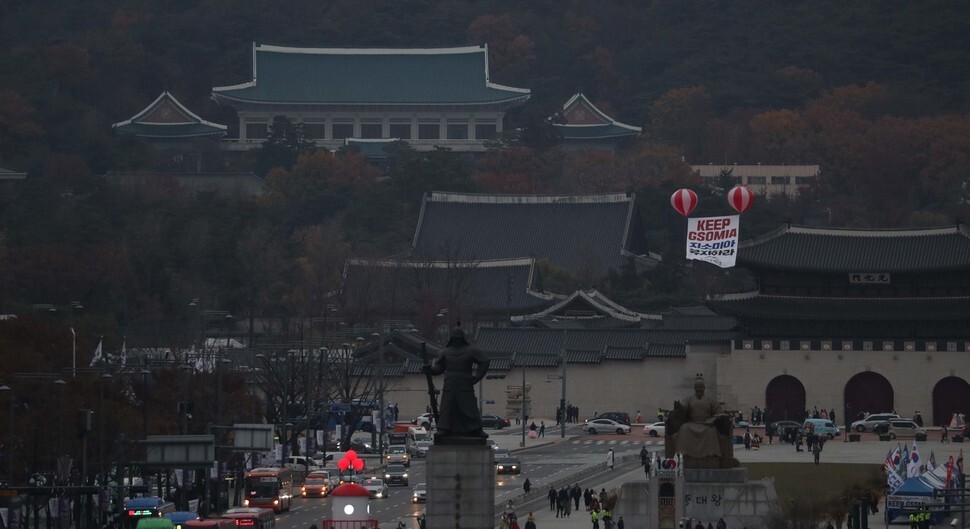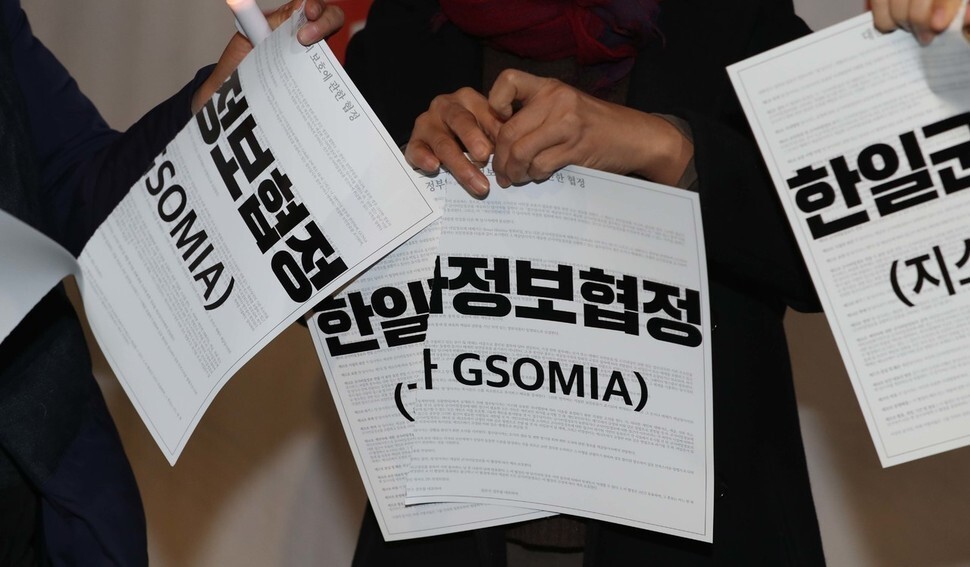hankyoreh
Links to other country sites 다른 나라 사이트 링크
Seoul continuing to seek diplomatic solution ahead of GSOMIA termination

Up until Nov. 21, shortly before the scheduled termination of South Korea and Japan’s General Security of Military Information Agreement (GSOMIA), Seoul was feverishly seeking a solution across all diplomatic channels. Even so, it seems likely that the two countries’ military information-sharing agreement will ultimately be scrapped.
“We’ve agreed to continue close deliberations with the major relevant countries,” the Blue House said, declining to make any definite predictions, but Foreign Minister Kang Kyung-wha told the National Assembly flatly that “GSOMIA will be terminated tomorrow unless the Japanese government has a change of attitude.” Meanwhile, Japan has dug in its heels.
The Blue House released a generic position statement following a meeting of the standing committee of the National Security Council (NSC), led by Blue House National Security Office Director Chung Eui-yong on Thursday morning. “The members of the standing committee reviewed the government’s diplomatic efforts to find a solution in matters affecting South Korea and Japan,” the statement said.
Along with pledging to continue reviewing diplomatic efforts and remain in consultation with related countries, the Blue House added that “committee members also deliberated contingency plans for a range of related scenarios.” While this language is vague, it appears to indicate obliquely that the meeting’s discussion largely focused on reviewing and discussing the expected aftermath of GSOMIA’s termination. This conjecture is reinforced by Minister of Trade, Industry, and Energy Sung Yun-mo’s atypical attendance at the NSC meeting

After the NSC meeting, Kang told the National Assembly’s Foreign Affairs and Unification Committee that “Japan’s export controls were obviously unfair and retaliatory and damaged trust. I don’t see this as a situation in which we can reverse a hard decision without any change from Japan.”
The Blue House announced the GSOMIA termination in Aug. 22, and the agreement will lapse at precisely midnight on Nov. 23. Regulations state that the agreement will come to an end three months after the termination announcement unless revoked by the government.
But the Blue House hasn’t ruled out the possibility of a last-minute change and intends to ask the Japanese government to completely retract the export controls on Nov. 22, hours before the deadline.
On Thursday, Blue House Senior Secretary for Political Affairs Kang Ki-jung met with Liberty Korea Party (LKP) leader Hwang Kyo-ahn, who is currently holding a hunger strike in front of the Blue House and calling on the Moon administration to rescind the GSOMIA termination. Kang Ki-jung explained to the opposition leader that the government was still doing its best, sending National Security Office Second Deputy Chief Kim Hyun-chong to the US and assigning other members of the diplomatic team to dialogue with Japan.
During a town hall meeting on Nov. 19, President Moon Jae-in himself promised to “keep working [to reach an agreement] with Japan until the last possible moment.”
In a related story, Kyodo News reported that Japanese Prime Minister Shinzo Abe hosted a national security meeting at his residence on Thursday afternoon, shortly before GSOMIA’s scheduled termination, and deliberated matters including the North Korean situation. The Japanese wire service said that the GSOMIA issue was also apparently discussed during that meeting.
“I am compelled to state that South Korea’s notification of termination [of GSOMIA] has always represented a complete misunderstanding of the regional security environment. We remain committed to strongly pushing [for South Korea] to act with wisdom,” said Chief Cabinet Secretary Yoshihide Suga, who serves as spokesperson for the Japanese government, during a regular press briefing that afternoon. Suga’s remarks are thought to be an indirect expression of Japan’s desire for South Korea to extend GSOMIA.
By Seong Yeon-cheol, staff reporter, and Cho Ki-weon, Tokyo correspondent
Please direct comments or questions to [english@hani.co.kr]

Editorial・opinion
![[Column] Season 2 of special prosecutor probe may be coming to Korea soon [Column] Season 2 of special prosecutor probe may be coming to Korea soon](https://flexible.img.hani.co.kr/flexible/normal/500/300/imgdb/original/2024/0426/3317141030699447.jpg) [Column] Season 2 of special prosecutor probe may be coming to Korea soon
[Column] Season 2 of special prosecutor probe may be coming to Korea soon![[Column] Park Geun-hye déjà vu in Yoon Suk-yeol [Column] Park Geun-hye déjà vu in Yoon Suk-yeol](https://flexible.img.hani.co.kr/flexible/normal/500/300/imgdb/original/2024/0424/651713945113788.jpg) [Column] Park Geun-hye déjà vu in Yoon Suk-yeol
[Column] Park Geun-hye déjà vu in Yoon Suk-yeol- [Editorial] New weight of N. Korea’s nuclear threats makes dialogue all the more urgent
- [Guest essay] The real reason Korea’s new right wants to dub Rhee a founding father
- [Column] ‘Choson’: Is it time we start referring to N. Korea in its own terms?
- [Editorial] Japan’s rewriting of history with Korea has gone too far
- [Column] The president’s questionable capacity for dialogue
- [Column] Are chaebol firms just pizza pies for families to divvy up as they please?
- [Column] Has Korea, too, crossed the Rubicon on China?
- [Correspondent’s column] In Japan’s alliance with US, echoes of its past alliances with UK
Most viewed articles
- 11 in 5 unwed Korean women want child-free life, study shows
- 2AI is catching up with humans at a ‘shocking’ rate
- 3[Editorial] Yoon cries wolf of political attacks amid criticism over Tokyo summit
- 4[Photo] “Comfort woman” survivor calls on president to fulfill promises
- 5“Japan’s No. 1 salesman”: Korean groups blast president’s treatment of forced laborers
- 6Yoon calls 60+ hour workweek “unreasonable,” orders revamp of policy
- 7[Editorial] Yoon’s white flag on historical disputes with Japan backfires immediately
- 8‘We must say no’: Seoul defense chief on Korean, USFK involvement in hypothetical Taiwan crisis
- 9[Special reportage- part I] Elderly prostitution at Jongmyo Park
- 10[Photo] More Sewol paintings by Hong Sung-dam